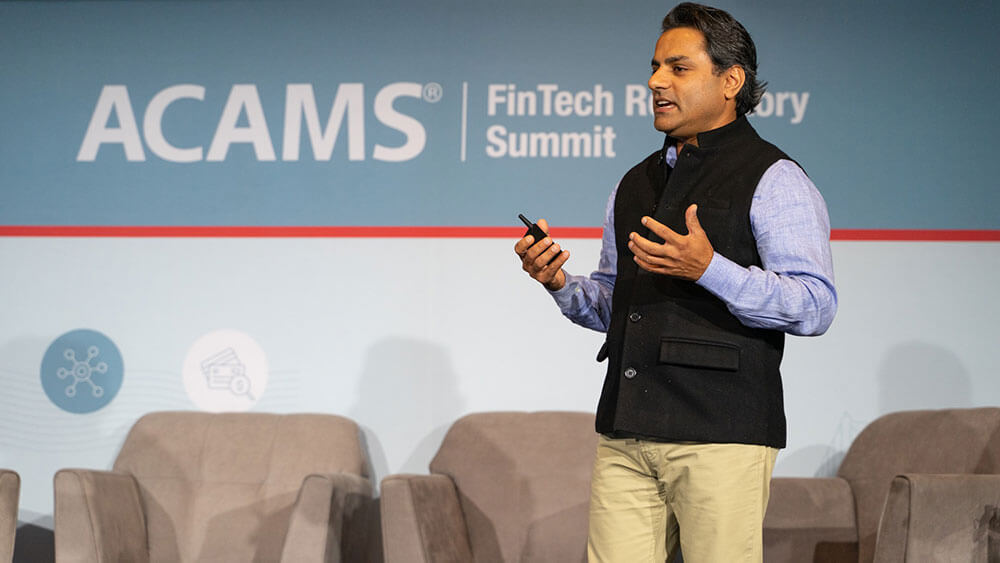
Rohit Sharma, CAMS, president and managing director of ACAMS, welcomes attendees to the ACAMS FinTech Regulatory Summit in San Francisco. The organization went on with the March 4 event despite the loss of attendees due to COVID-19 restrictions. (Courtesy ACAMS)
Takeaways from Kristin Copley-Mirabal, director of global events, ACAMS:
- Understanding where your audience is coming from, both geographically and in regards to their companies’ own directives, is critical during a crisis like COVID-19.
- Be sure to provide updates and factual information addressing concerns in your website — and make sure you overcommunicate with your internal teams.
- Rely on your community of fellow event organizers as a resource, and be engaged with the industry network within the field that your association represents.
When Convene spoke with Kristin Copley-Mirabal, director of global events, ACAMS (Association of Certified Anti-Laundering Money Specialists) on March 3, she was on site in San Francisco, the day before ACAMS 2nd Annual FinTech Regulatory Summit. And she was ticking off how many more global events ACAMS would hold — 11 — before the end of June, from Jakarta to Johannesburg to Toronto to Panama.
Much has happened since March 3, and some of those events may not take place because of limits on the size of gatherings put in place by local public health authorities and local governments and the evolving situation with travel bans. Mirabal had been operating under the premise that unless there was some mandatory shutdown of events, “we were going to carry on.”

Kristin Copley-Mirabal
Travel restrictions imposed by the employers of some attendees had reduced attendance from around 300 to 250 at the San Francisco event and at other international events, including an ACAMS event in the Baltics in early March, which was impacted by travel restrictions for those coming from Italy.
The best advice Mirabal could give on March 3 for those considering whether holding an event still seemed viable was to understand where your audience is coming from. “Whether they’re domestic and their company restrictions and what company instructions might be imposed,” she said. “Or your speakers and if they’re coming in from overseas. I think that’s what’s going to have the biggest impact on our events right now.”
The COVID-19 crisis has demonstrated another role event planners can take. When the city of San Francisco declared a state of emergency before the ACAMS event, some international members panicked, not understanding that to be a precautionary measure. Mirabal had to explain that “it’s so that they can access and mobilize funds and personnel should the need arise. Which is the operative phrase. Should the need arise.” As a planner, she said, “we are in a position to put things in context.”
During the crisis, being proactive with messages on each ACAMS event’s website with updates and factual information addressing concerns has been critical. Also, staying in close contact with event speakers, she said, who are professionals that “really have a pulse on our industry,” and are knowledgeable about corporate travel bans.
For the events that have to be canceled, Mirabal said she will move content online, but not replicate the face-to-face event with a virtual one. When you have cancellation insurance for your events, you may run into issues by making it seem that the live event has been replaced by an online one over the same dates, she said. Because of insurance implications, some of the program content is being delivered virtually in webinars over different dates.
“We haven’t finalized it yet, but it’s likely that we’re going to have some sort of digital or virtual education because that’s our mission,” she said. “I mean that’s our responsibility is to educate and we do think that we’ll see an uptick in our webinars, as people need them. And we also have a certification, so people earn credits when they attend our events so that they can be accredited. And if they lose that by not going to live events, we do think that we’ll see an uptick in our virtual events.”
During this crisis, Mirabal has found her community of fellow event organizers to be an important resource. “You know how I stay up to date on all of this? You know what I use? My colleagues. I hear things from our colleagues. I’m on a Facebook group of planners,” she said, who share information and their experiences, and “and I’m constantly seeing things like, ‘Oh, I didn’t think about that or I didn’t know about that.’”
It’s also been important for her to be engaged with her industry network within the financial field that ACAMS represents. “We have planning calls. We have so many events that we’re constantly on the line with our advisory board,” Mirabal said, and “with our speakers and they give us kind of the pulse of the industry. So I think that’s really important is keeping engaged. Being able to call upon trusted individuals within your industry to find out how are they feeling or what’s going on within their own companies or institution. And your board of directors is another great resource. Going out to them saying, ‘What are you hearing, what are you doing?’
“But the other thing too is keeping your own internal stakeholders abreast of what’s happening,” Mirabal said. “On my nice six-hour flight last night, I was sending out emails to our customer service team, our sales team, our events team globally. I think that those lines of communication internally are critical — we don’t want to forget internally because it’s our customer service folks that are on the front lines answering these calls. We really need to make sure that they are up to date with the most current information. And what the company policy is. We’ve gotten very specific — what are we doing if someone wants to cancel but we’re not canceling the event. Are we issuing them a refund or are we giving them a credit to another event? We are very specific as to how we’re handling each one of these situations. I think that’s very important to have a consistent message across your company or your association.”
The situation, Mirabal said, is “heartbreaking,” but planners need to accept that “it’s fluid and things may quickly change. Because we’re all accepting it now. It’s like we’re putting this all up now, but next week something might happen and we may have end up having to say, ‘Okay, we’re canceling this.’”
Michelle Russell is editor in chief of Convene.
What Events Professionals Need to Know About COVID-19
PCMA has created a COVID-19 resources page to help event professionals find reliable information about the outbreak and to share events industry-related resources to ensure they are prepared.
